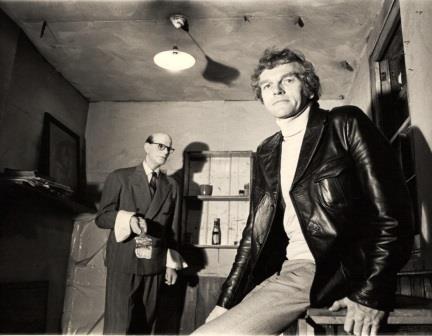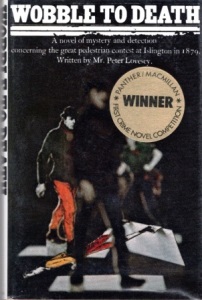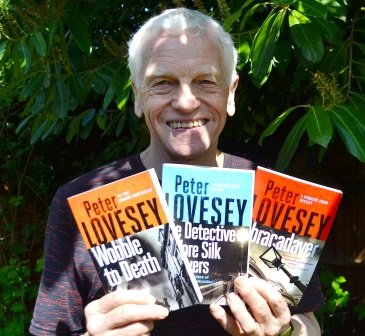Soho
Press recently announced the Peter Lovesey First Crime Novel Contest
with a $10,000 prize to mark the fiftieth year since Peter’s crime-writing
career was launched with a similar competition. This is his wry look back at
the way things were done half a century ago.

For
crying out loud! (as I think I said in 1969) A thousand pounds is more than my
salary as a teacher. I’d seen a small ad in the personal column of The Times
and sent for the details. The long-established publishing house of Macmillan
had decided to start a crime fiction list and had persuaded the editor at
Collins Crime Club to defect to them and set it up. He was George Hardinge and
he was a peer, the third Baron Hardinge of Penshurst. It was his idea to launch
the list with the first crime novel contest.
What
would work as a crime novel? In 1969, Agatha Christie, John Dickson Carr, Rex
Stout and Ngaio Marsh were still writing. The detective story was regarded by
purists as a classic form in which clues were laid, fair play was important and
everything was revealed at the end.
I
had written a non-fiction book called The Kings of Distance about the
history of running, but a crime novel was a daunting new challenge. Fortunately
my wife Jax was a keen reader of crime fiction and encouraged me. I used a
Victorian six-day long-distance race as the setting and wrote a story that
slotted easily into the whodunnit structure. The press called such races
wobbles, providing me with a catchy title.
In
June, 1969, a letter arrived from Lord Hardinge that began, ‘We have been
considerably interested in Wobble to Death . . .’ My own knees wobbled. Macmillan wanted to
know more about me before reaching a decision. I sent back a brief CV and was
invited to meet Lord Hardinge for a drink at his London club, Brooks’s. I’d
never been inside such a place.
George
Hardinge, the grandson of a Viceroy of India, had been Page of Honour to three
kings and looked and sounded as if he had risen above them all. I was in awe of
him, but his conspiratorial smile soon disarmed me and I almost hugged him when
he told me my book was the winner from more than 250 novels.
In
my wildest dreams I wouldn’t have guessed what would happen to me as a result
of becoming a crime writer. I would find myself wobbling around Sloane Square
with the Carry-On star, Barbara Windsor; placing my hand on a skull and
promising to keep the rules of the Detection Club; and spending a night filming
in the Chamber of Horrors.

The
party at the Law Society Hall in October was another eye-opening experience
with pinstripes, bow ties and cigars much in evidence. I met some of the top crime
writers – Julian Symons, Edmund Crispin and H.R.F.Keating. The runners-up in
the contest were Graham Lord, the Sunday Express book critic and Alfred Draper,
also an Express man. Each, like me, would go on to write more crime novels, so
the contest paid off handsomely for Macmillan. I learned years later that a
young man not long out of Oxford called Simon Brett had also submitted a story.
When
I was invited up, Alan Maclean, the director and senior editor (and brother of
the spy, Donald Maclean), offered the cheque, but held onto it so tightly that
I almost tore it in half. He wanted a word in my ear about writing a follow-up.
In all the excitement, I hadn’t given this a thought. But I was cornered soon
after by Roger Longrigg, a witty, engaging and prolific writer who published
under a string of pseudonyms. ‘A word in your ear, dear boy. Always make sure
that you’re well into writing the next one before a book is published and then
the critics can’t hurt you because the new one is always going to be better
than the last.’ How right he was. I’ve adhered to this advice ever since.
Roger
Longrigg was a publishing legend. In the guise of Rosalind Erskine, a
precocious schoolgirl, he had written The Passion Flower Hotel, a mildly
erotic bestseller, and he also produced comic fiction, historicals set in
Scotland and spy thrillers, all under different names. As Grania Beckford, he
wrote the first erotic send-up of Jane Austen, a reworking of Persuasion
entitled Virtues and Vices: a Delectable Rondelet of Love and Lust. In
the crime world he was Ivor Drummond. Like me, he entered and won a first crime
novel competition, the John Cheever Mystery Prize, reinventing himself as Frank
Parrish and causing a scandal when they discovered this was actually his
twentieth published book.
Publication
day for me was marked with a publicity stunt, a 24-hour wobble around Sloane
Square for charity. Barbara Windsor joined in and wobbled better than anyone.

My
career after the fanfare of the competition was an endurance event on its own,
beginning with eight historical mysteries featuring Sergeant Cribb, the
bowler-hatted detective played by Alan Dobie in the Granada TV series. In 1975,
I asked Lord Hardinge for advice about acquiring a literary agent and he told
me the best in London was George Greenfield of John Farquharson Ltd. With
George’s enterprising help, my income improved and I retired from teaching to
earn my living as a writer. After George retired in 1986, I joined Vanessa
Holt, who had been the foreign rights director at Farquharson and has looked
after me ever since. I wrote several stand-alones and three more Victorian
whodunnits casting Bertie, the Prince of Wales, as an inept amateur sleuth.
In 1991, I joined a short-lived publishing venture
called Scribners with a book called The Last Detective, which opened
with a drowning. It seemed prophetic. Within months the body of the owner of
Scribners, the infamous Robert Maxwell, was recovered from the Atlantic.
Fortunately Little Brown took over and I have been with them ever since and
published twenty contemporary police procedurals, most of them starring Peter
Diamond, the Bath detective.
It
will be a joy to me when a new writer is discovered through the Soho Press
first crime novel contest and has the opportunity of all the excitement and fulfilment
I have enjoyed.

Details
of the new Peter Lovesey crime novel contest can be found at https://www.loveseymysterycontest.com-rules-how-to-submit
Peter
Lovesey’s website is www.peterlovesey.com